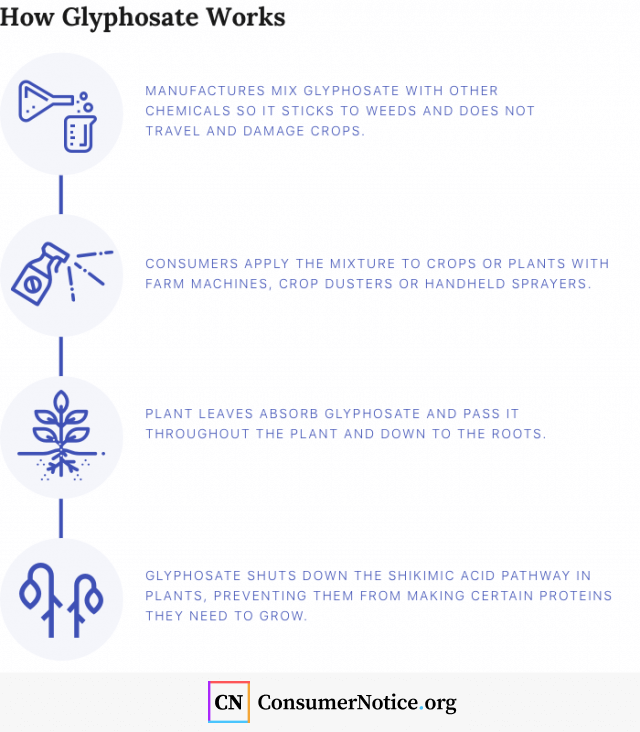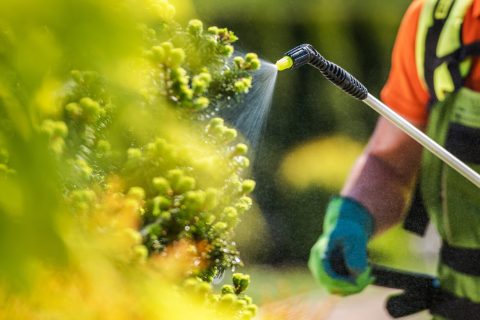Roundup
Research suggests a link between the popular glyphosate weed killer Roundup and cancer. The World Health Organization's International Agency for Research on Cancer concluded glyphosate is “probably carcinogenic,” but the U.S. Environmental Protection Agency maintains more evidence is needed.

Roundup and Glyphosate
Roundup is the brand name for an herbicide containing the active ingredient glyphosate. Glyphosate is a nonselective weed killer, meaning it can kill most plants on contact within days or weeks. Agricultural workers often apply glyphosate by spray to large areas of crops.
As of June 2023, Roundup with glyphosate was still available in retail stores and online. However, Bayer, the current manufacturer, has said it may begin removing glyphosate from its consumer products within the year. Bayer will base its decision to remove glyphosate from Roundup on reviews by the U.S. Environmental Protection Agency and state counterparts.
In June 2023, Bayer agreed to pay $6.9 million to resolve claims by the New York attorney general that the company misled consumers. The claims say Bayer promoted Roundup as an environmentally safe product. The settlement also requires Bayer to stop advertising Roundup containing glyphosate as safe and nontoxic.

Roundup was initially developed for large-scale farming operations but is now available in home and garden versions and has become a popular household pesticide. Glyphosate is the most widely used pesticide in global agriculture, and glyphosate-based products are the second-most widely used home and garden weed killers.
In 2015, a United Nations agency listed glyphosate as “probably carcinogenic,” spurring controversy over whether a link exists between Roundup and cancer. Courts and regulatory agencies have had conflicting reactions to the claim. In 2017, the EPA issued a draft report concluding that glyphosate, the main ingredient in Roundup, is safe and “not likely” to cause cancer in humans. The agency is still reviewing data on the herbicide to determine whether it can increase the risk of cancer or other serious illnesses when used as suggested.
Widespread Use of Roundup Weed Killer
Although Roundup use is still widespread, Bayer reported a recent slump in profits in 2023. Bayer expects its revenue to drop by approximately $1.8 billion, due in part to Roundup litigation and falling prices. Legal experts report there are thousands of ongoing Roundup lawsuits over glyphosate exposure. Litigation has also prompted municipalities across the U.S. to restrict Roundup use and enact bans on Roundup.
In the U.S., no pesticide has come remotely close to such intensive and widespread use
Roundup use peaked between 2004 and 2014, accounting for two-thirds of its use since its launch in 1974. The EPA estimated that by 2016, Roundup use had reached between 280 million and 290 million pounds per year. Glyphosate use exploded exponentially in 1996 when Monsanto introduced “Roundup Ready” crops. The genetically modified seeds were immune to glyphosate’s effects.
Previously, farmers had applied Roundup before their crops emerged from the ground or after harvest to kill lingering weeds. The new seed technology let farmers use glyphosate even as their crops were growing. As a result, farmers used as much as triple the amount of glyphosate.
Roundup Risks
There are risks associated with Roundup use because of its active ingredient, glyphosate, but governing bodies have not officially classified the chemical as a carcinogen. The World Health Organization and the U.S. Environmental Protection Agency disagree on the safety of Roundup. The EPA classifies Roundup as “safe for use,” but the International Agency for Cancer Research, an arm of the World Health Organization, classifies glyphosate as a “probable human carcinogen.” Roundup products continue to be sold without a cancer risk warning label.
Research on Roundup and cancer is still evolving, but studies show some evidence that exposure to high levels of glyphosate may increase the risk of developing non-Hodgkin lymphoma among people exposed to the chemical over long periods of time. Research also shows that long-term high level glyphosate exposure may impact the developing fetus in pregnant women and that glyphosate damage to gut bacteria may negatively impact the growing brains of young children. Effects of Roundup exposure can be mild or severe, depending on the length and amount of exposure.
- Autism: Research shows that glyphosate crosses into the brain and increases inflammation, which may lead to neurodegenerative disorders. A 2020 study indicated that a mother's exposure to glyphosate during pregnancy may increase her child's risk of developing autism spectrum disorder or similar conditions.
- Leukemia and Multiple Myeloma: In 2019, researchers found glyphosate may contribute to blood and bone abnormalities that could make multiple myelomas more likely. Separate research shows that high levels of exposure to glyphosate increase the risk of leukemia.
- Non-Hodgkin Lymphoma: A study from 2021 shows a link between glyphosate exposure and non-Hodgkin lymphoma. NHL was more likely after long-term exposure.
- Parkinson's Disease: Multiple studies show that short, acute exposure and long-term, chronic exposure to glyphosate can increase the risk of Parkinson's disease.
Although glyphosate doesn’t stay in the air very long, it can remain in the soil for months depending on climate, soil pH and other factors. When glyphosate breaks down, it contaminates soil and water. Researchers at McGill University showed that even bodies of water exposed to moderate amounts of glyphosate had less diversity over time, negatively impacting that ecosystem. Glyphosate is also highly toxic to some water animals, particularly invertebrates.
Research shows that the other components of glyphosate-containing herbicides, like surfactants, can also have a negative environmental impact. Glyphosate and the components in Roundup can impact the environment by affecting the growth of soil microorganisms, in some cases causing an increase in microorganisms that can be dangerous to humans and animals.
What Should I Do if I’m Exposed to Glyphosate?
If you’ve been exposed to glyphosate and diagnosed with diseases such as non-Hodgkin lymphoma, speak with an experienced attorney. People can still file lawsuits for compensation for medical expenses, lost wages, lost earning potential, pain and suffering. Individuals can file a wrongful death suit if a loved one has died due to Roundup exposure.
In some cases, courts have determined that Roundup exposure led to cancer and have awarded millions of dollars to individual parties. Most often, research linked these cases to long-term workplace exposure over decades. Large multidistrict Roundup suits that bring hundreds of separate lawsuits together under one judge have led to settlements of billions of dollars, and many are still ongoing.
Short-term acute exposure to glyphosate requires medical attention. Acute exposure to glyphosate can irritate the eyes, nasal passages, throat and lungs and cause breathing issues.
Alternatives to Roundup
Roundup alternatives don’t contain glyphosate. Most ready-made products contain acetic acid, vinegar or plant-based oils and soaps. These formulas can rapidly kill weeds by damaging the leaf cuticle and causing cell leakage. Like Roundup, these products kill plants on contact and can only be applied directly to weeds.
Roundup alternatives such as corn gluten meal and iron-based herbicides may only work under specific conditions. Manual weed control methods, such as mulching, can effectively control young weeds, and boiling water poured over adult plants will deter growth. Integrated weed management systems that combine approaches work best as Roundup alternatives.
- Corn gluten meal
- Herbicidal soaps
- Iron-based herbicides
- Manual removal of weeds
- Mulch
- Vinegar
The University of Maryland Extension Service says most alternatives are not as effective as glyphosate. It recommends using alternative herbicides with other gardening practices such as soil health and irrigation methods.
Natural does not always mean safe. Most vinegar and natural-oil herbicide alternatives are more toxic to human skin than glyphosate or other synthetic pesticides. People should avoid inhaling these alternatives and getting them on their skin or in their eyes.
Roundup alternatives can have downsides for plant use as well. Acid-, iron- and soap-based alternatives damage the outer layers of a plant and, like Roundup, will damage any plant they come in contact with.
16 Cited Research Articles
Consumernotice.org adheres to the highest ethical standards for content production and references only credible sources of information, including government reports, interviews with experts, highly regarded nonprofit organizations, peer-reviewed journals, court records and academic organizations. You can learn more about our dedication to relevance, accuracy and transparency by reading our editorial policy.
- Stempel, J. (2023, June 15). Bayer reaches $6.9 million settlement with New York over Roundup safety claims. Retrieved from https://www.reuters.com/legal/government/bayer-reaches-69-mln-settlement-with-new-york-over-roundup-safety-claims-2023-06-15/
- Burger, L. (2023, May 11). Bayer sees 2022 results at lower end of range as weedkiller prices drop. Retrieved from https://www.reuters.com/business/healthcare-pharmaceuticals/bayer-sees-2023-results-lower-end-range-weedkiller-prices-drop-2023-05-11/
- Rawat, D. et al. (2023, April). Hazardous impacts of glyphosate on human and environmental health: Occurrence and detection in food. Retrieved from https://www.sciencedirect.com/science/article/abs/pii/S0045653523009438
- Winstone, J.K. et al. (2022, July 28). Glyphosate infiltrates the brain and increases pro-inflammatory cytokine TNFa: implications for neurodegenerative disorders. Retrieved from https://jneuroinflammation.biomedcentral.com/articles/10.1186/s12974-022-02544-5
- Ghandi, K. et al. (2021, August). Exposure risk and environmental impact of glyphosate: Highlights on the toxicity of herbicide co-formulants. Retrieved from https://www.sciencedirect.com/science/article/pii/S2667010021001281
- Bayer. (2021, July 29). Bayer Provides Update on Path to Closure of Roundup Litigation. Retrieved from https://www.bayer.com/media/en-us/bayer-provides-update-on-path-to-closure-of-rounduptm-litigation/
- Weisenburger, D.D. (2021, April 23). A Review and Update with Perspective of Evidence that the Herbicide Glyphosate (Roundup) is a Cause of Non-Hodgkin Lymphoma. Retrieved from https://www.clinical-lymphoma-myeloma-leukemia.com/article/S2152-2650-21-00151-8/fulltext
- Pu, Y. et al. (2020, June 21). Glyphosate exposure exacerbates the dopaminergic neurotoxicity in the mouse brain after repeated administration of MPTP. Retrieved from https://www.sciencedirect.com/science/article/abs/pii/S0304394020303025
- Pu, Y. et al. (2020, May 12). Maternal glyphosate exposure causes autism-like behaviors in offspring through increased expression of soluble epoxide hydrolase. Retrieved from https://www.pnas.org/doi/full/10.1073/pnas.1922287117
- Cardenas, S. (2020, March 2). Widely used weedkiller harming biodiversity. Retrieved from https://www.mcgill.ca/newsroom/channels/news/widely-used-weed-killer-harming-biodiversity-320906
- Monnier, J. (2019, October 10). Cities Are Worried About the Health Effects of Glyphosate. Retrieved from https://www.bloomberg.com/news/articles/2019-10-10/why-u-s-cities-are-banning-glyphosate-pesticides
- Wang, L. et al. (2019, July 5). Glyphosate induces benign monoclonal gammopathy and promotes multiple myeloma progression in mice. Retrieved from https://jhoonline.biomedcentral.com/articles/10.1186/s13045-019-0767-9
- Eriguchi, M. et al. (2019, July 1) Parkinsonism Relating to Intoxication with Glyphosate. Retrieved from https://www.ncbi.nlm.nih.gov/pmc/articles/PMC6663540/
- National Pesticide Information Center. (2019, July). Glyphosate General Fact Sheet. Retrieved from http://npic.orst.edu/factsheets/glyphogen.html
- Andreotti, G. et al. (2017, November 9). Glyphosate Use and Cancer Incidence in Agricultural Health Study. Retrieved from https://academic.oup.com/jnci/article/110/5/509/4590280
- Smith-Fiola, D. & Gill, S. (2017). Vinegar: An Alternative to Glyphosate? Retrieved from https://extension.umd.edu/resource/vinegar-alternative-glyphosate
Calling this number connects you with a Consumer Notice, LLC representative. We will direct you to one of our trusted legal partners for a free case review.
Consumer Notice, LLC's trusted legal partners support the organization's mission to keep people safe from dangerous drugs and medical devices. For more information, visit our partners page.
855-605-1792

